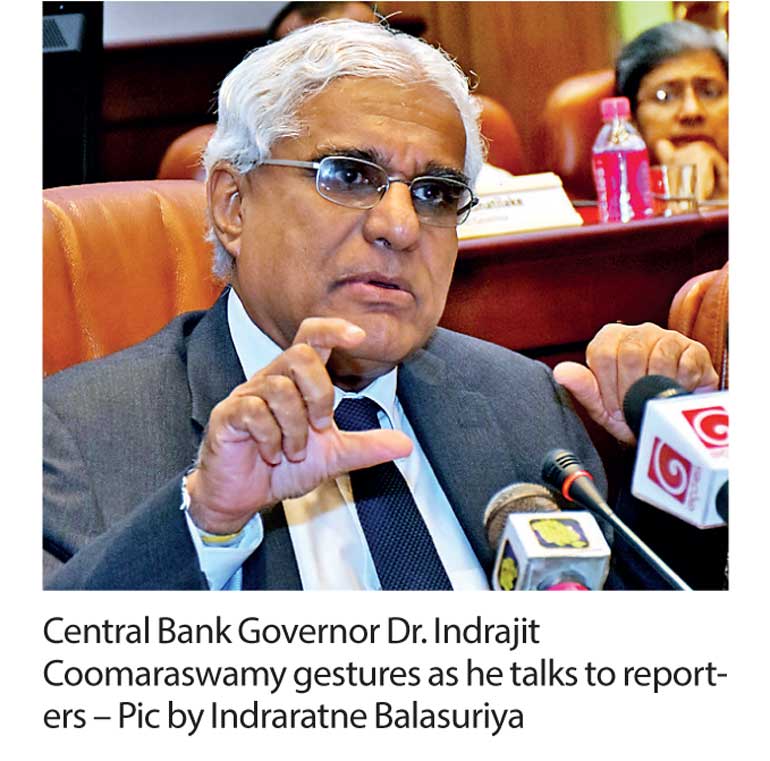Thursday Feb 26, 2026
Thursday Feb 26, 2026
Wednesday, 27 September 2017 00:00 - - {{hitsCtrl.values.hits}}

By Uditha Jayasinghe
As the days tick down to Budget 2018, the Central Bank yesterday called on its partner, the Finance Ministry, to refrain from pumping demand through the Budget ahead of possible elections next year, and maintain fiscal consolidation.
Typically governments include handouts, tax cuts, salary increases to the public sector and other populist measures to attract votes, which could undermine fiscal consolidation that the Government has undertaken since early 2016.
“Traditionally that has happened but now we are in a new paradigm where we are exposed to rating agencies and international capital markets in a way that we have never been exposed before. We need to maintain our ratings to be able to raise the money at reasonable cost to repay the stock of debt we have already incurred. The main source of instability in the system has always been the Budget deficit,” Central Bank Governor Dr. Indrajit Coomaraswamy told reporters.
In 2018 Sri Lanka has high levels of local debt repayments while foreign debt repayments are projected to top $ 4 billion in 2019. Rating agencies have estimated that Sri Lanka will have to repay about $ 13.8 billion in debt from 2019-2022.
“If we lapse back into our old ways the costs will be far greater than what we have ever experienced in the past because then we will have serious difficulty in accessing the markets at a reasonable cost and in the end we will have to have very painful adjustments. So it is extremely important that the Government maintains the trajectory of fiscal consolidation that it has embarked upon. It has done well so far,” he added. The country’s deficit target of 4.6% for 2017 may also be marginally missed by 0.5%, the Governor predicted, which would bring the deficit to about 5.1%.
The deficit was largely caused by inclement weather conditions including an ongoing drought that is said to be the worst in four decades.
“Growth will pick up in the second half, for instance I think GSP+ should begin to kick in by the fourth quarter, and the agricultural preparation work for the ‘Maha’ season will create some activity. Overall growth for the year will be somewhere between 4%-4.5%.”
However, the Government’s macroeconomic management continues to be a plus point with the Monetary Board deciding to keep its policy rates unchanged in the latest review. Despite inflation hitting 7.9% in August, the Governor was optimistic that it would moderate to about 5% by the end of the year. Exports also continued to grow for the fifth consecutive month and remittances grew in July after being sluggish for most of the year. Foreign exchange pressure on the rupee also decreased due to the flexible exchange rate policy followed by the Central Bank, the Monetary Policy report said as the reasons for keeping rates unchanged.
“Private sector credit is at about 18% but we would like it to come down to about 15% by the end of the year. For the moment reductions in the primary and secondary markets have not passed through significantly to the lending rates. It will happen, there is usually a lag and when that happens if it leads to what the Monetary Board thinks is unsustainable credit growth then clearly action would be taken to tighten monetary policy. But we have not gotten there yet.”
Dr. Coomaraswamy also backed the new Inland Revenue Act that could incentivise foreign investors to rupee bonds as they may not have to pay taxes after April 2018.
Sri Lanka lifted a 10% withholding tax government bonds from April 2017 which was earlier paid up front and a tax credit was available for domestic investors. Deputy Governor Nandalal Weeresinghe said generally the principle was to tax residents of a country. Taxes are usually paid in the country of residence, he said.
Tax experts earlier said foreign investors may have to open tax accounts in Sri Lanka to pay capital gains and income tax. In general, investors from one country who invest in another country with which it has double taxation agreements can claim tax credits
“At the moment there is no tax for foreign investment into Government securities. My understanding is that the Government is looking into this,” Dr. Coomaraswamy said.